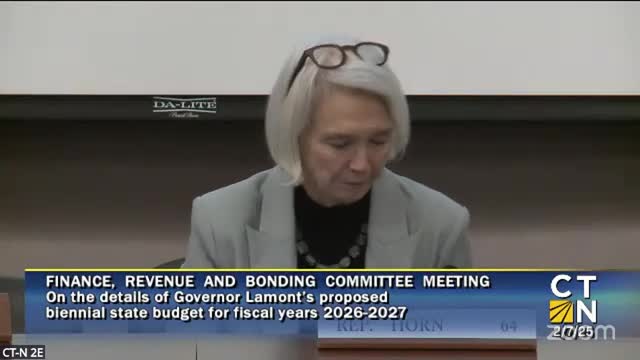Lamont budget would adjust volatility cap, seed universal preschool endowment and rebalance tax and bond priorities
Get AI-powered insights, summaries, and transcripts
Subscribe
Summary
Office of Policy and Management Secretary Beckham presented Governor Lamont’s proposed biennial budget to the Finance, Revenue and Bonding Committee, saying it is ‘‘balanced, albeit narrowly,’’ and includes a one‑time adjustment to the statutory volatility cap threshold, seed funding for a Universal Preschool Endowment, rebasing of the hospital tax base to 2024 and a mix of tax and capital proposals.
HARTFORD — Office of Policy and Management Secretary Beckham told the Finance, Revenue and Bonding Committee that Governor Lamont’s proposed budget for fiscal 2026–27 is balanced ‘‘albeit narrowly’’ and relies on a one‑time change to the state’s volatility threshold, seed funding for a Universal Preschool Endowment and a mix of tax changes and bond authorizations.
The proposal, presented to the committee on the governor’s behalf, shows recommended spending growth of about 3.8 percent in FY26 and 4.6 percent in FY27 above the current fiscal year. Beckham said the administration assumes a $304 million unappropriated revenue buffer in FY26 and roughly $317.8 million in FY27 and is asking the General Assembly to raise the volatility cap threshold by statute so more revenue becomes available for the general fund.
Why it matters: the administration says the change would free money for priorities such as early childhood, housing and municipal aid while leaving a narrower buffer to protect the budget if volatile revenues fall short. Opponents on the committee warned that changing the guardrails could weaken Connecticut’s recent progress in reducing long‑term liabilities.
Beckham summarized the administration’s approach as balancing relatively healthy near‑term revenue with the constitutional and statutory requirements that govern Connecticut’s spending cap and volatility protections. ‘‘The law that was enacted in 2017 contemplated that it would be raised,’’ Beckham said, adding the administration is recommending a ‘‘one‑time adjustment based on that five year average’’ and that any statutory change would require a three‑fifths vote of both houses.
The budget would also seed a Universal Preschool Endowment using unappropriated surplus funds, Beckham said. The proposal would deposit available unappropriated surplus into the endowment and direct that future unappropriated surpluses be transferred to it; the treasurer would manage the endowment as a trust and the commissioner of early childhood, in consultation with the education commissioner, could expend up to 10 percent of the endowment’s balance in any fiscal year to expand preschool slots and related supports.
On health care, Beckham told the committee the administration intends to update the hospital tax revenue base from tax year 2016 to 2024 once the current settlement agreement expires at the end of FY26. That rebasing would increase hospital supplemental payments and draw additional federal Medicaid reimbursement; Beckham said the administration expects to negotiate with hospitals and the comptroller’s office on details and would seek to protect hospitals that are already financially stressed.
Tax proposals included an $85 million enhancement to the property tax credit, elimination of some occupational licensing application and renewal fees for workers in healthcare, education and skilled trades, reforms to the corporation tax base (including repeal of the capital base tax), a modest reduction in the film production tax credit percentage and an extension of an existing corporate surcharge for three more years. Beckham said the changes aim to broaden base fairness while continuing targeted relief for individuals and workers.
On the capital side, the administration proposes roughly $2.5 billion in general obligation authorizations in each year of the biennium and a package of revenue‑ and GO‑backed bonds totaling several billion when combined. Priorities include housing (the budget continues a multi‑year housing commitment), transportation projects that leverage federal funds, $1 billion in new school construction authorizations and funding for select state facilities, including design dollars for replacement of Whiting Forensic Hospital and planning for courthouse consolidations in New Haven and Bridgeport.
Municipal aid: Beckham said the governor’s budget fully funds statutory municipal aid formulas and recommends removing an automatic surplus distribution in the Municipal Revenue Sharing Fund so the General Assembly can allocate any surplus more deliberately. To keep towns whole for statutory entitlements given current sales tax receipts, the administration proposes transferring $85 million from the general fund to the Municipal Revenue Sharing Fund in FY26.
Transportation and fees: the budget includes continued investments in bus and rail but assumes modest fare increases in part to help close cost gaps. Beckham noted the Special Transportation Fund has a ‘‘narrow operating balance’’ in the near term and that the administration recommends returning Town Aid Road funding to the capital budget rather than keeping it on the STF.
Committee members asked about risks presented by possible federal changes to discretionary grant conditions. Beckham said the administration had no specific federal notice to date and would monitor and present options if specific funding streams are threatened. On hospital proposals, Beckham acknowledged winners and losers could emerge from rebasing and said the administration planned negotiations and close monitoring, including matters tied to the Waterbury Hospital bankruptcy process.
The committee followed the presentation with questions from senators and representatives about guardrails, tax enforcement, the size and timing of the preschool build‑out, special education funding and the mechanics of the hospital tax changes. Beckham said technical details and program plans would be available in the budget documents posted online and in subsequent appearances by commissioners before the Appropriations Committee.
The committee is scheduled to begin formal review and markup activity at subsequent hearings; Beckham said the administration will provide follow‑up materials and work with lawmakers on specifics.
Ending: The committee heard the presentation as an informational step ahead of Appropriations meetings; no formal committee votes were recorded at this hearing.
